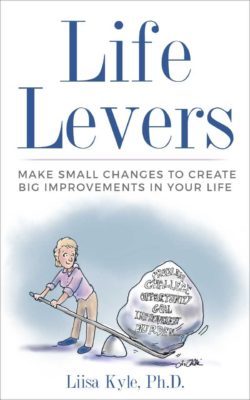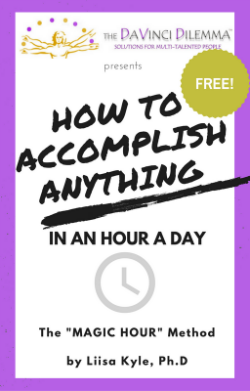There are many methods you might use to to ferret out your talents, or choose among them and decide which to pursue. What would you do without being paid? What’s easy for you that is hard for other people? You could remember activities from childhood that you enjoyed and see how they translate to your life or career now.
One of the criteria I like most, because it gets me out of my head, is asking:
What activity do you get lost in? What makes you forget all about the time? What do you do that is so engrossing, that you suddenly look up and realize it’s dark out, you’ve drooled on your shirt, you haven’t eaten, and neither your nor your dog has relieved him or herself since seven this morning?
Now this is a dangerous question, because there are two ways of getting lost, and only one of them is good.
Two Ways to Get Lost
We all know the Bad kind of Lost. This is the kind also makes us lose track of time, but drains us rather than nourishing us, and wastes time rather than invests it. This kind of Lost is deadly effective in disposing of large chunks of time, sometimes entire days, and may involve one or more of the following:
o Television
o Email
o Excessive Twitter, chat rooms, forums and other ways of socializing with people we don’t really know or care about
o A bottle of anything you need I.D. or a face that’s been around the block to purchase
o Gossip or Needless Drama
o Magazines with the words “Shocking” or “Secret” or “Affair” anywhere on the cover
o Chocolate Anything in a container that should feed a group of people but that you are using as a single serving
o Compulsive Housework. Desk Re-Arranging or Filing
o And my all-time favorite go-to vehicle: worry, guilt or regret, good for hours of unproductive brooding.
Students of Steven Covey’s Quadrant system he outlined in his book The Seven Habits of Highly Effective People will recognize in this list the deadly Quadrant 4, the Not Urgent and Not Important. Self-help guru Tony Robbins calls it The Dimension of Distraction.
These are all to varying degrees means of escape, and are not necessarily dangerous (except in the case of negative thinking, which should always be nipped in the bud) when kept in check, but when you allow yourself to Get Lost in them can eat your whole life. They become the equivalent of spending the money you really wanted to save for your dream house on Chia Pets, Ginsu knives and other things sold on TV at 3 AM. Some people describe it as killing time, but why would you want to do that? And who or what exactly do you think is dying?
Where Bad Lost wastes time, Good Lost transcends it. Good Lost makes you feel energized after hours of what might look like work. Good Lost makes you feel more alive, not less, when you “come back.” Like meditation, it keeps you focused in the present without judgment or worry. It also often makes what you did during that time of a high level of quality. Some people call this state being “in the Flow.” It isn’t easy to attain, but it does leave clues about you and your talents. Luckily, the more you get there, the easier it is to find your way back.
It may happen at unexpected times, doing activities you didn’t think were “you”. Some instances when I have gotten lost in a good way have been surprising until I thought about them. I knew it can happen when I write or paint, but I once spent 12 hours happily building a website from HTML code. I was confused, since I am NOT a computer person. However, when I analyzed what about this activity got me lost, I saw that certain elements were present: design, learning and using a new language and solving problems creatively – all talents I love to use.
Activity:
- In Finding Your Own North Star, author and coach Martha Beck gives an exercise where she asks you to list three activities that make you forget what time it is. Do this now . (Caveat: restrict your list to “Good Lost” activities, which probably does not include “dancing with the Stars” Marathons. )
- Now, go a step further and ask yourself (especially if your choices don’t seem to speak directly to your talents): what elements of those activities are what make them engrossing and satisfying to you? Aesthetics? Storytelling? Inventing something new? Designing an unexpected solution to a problem?
- Notice the next time it happens to you – you don’t know where the time went, and you’re feeling energized and happy. What were you doing? Keep your antennae up for this sort of experience and make a note of it. Is a pattern emerging?
- Identify your go-to “Bad Lost” activities (too much TV, email, social media, etc.) and schedule time for them in your week so that they can be fun breaks rather than time-eaters.
These answers will provide direction to which of your many talents you might be happiest pursuing, either as a nourishing pastime, or as part of a career.
So get lost. Chances are it’s where you’ll find yourself.
What sort of activities do you get lost in? Please share them with your fellow DaVincis here.
*****
If you’d like to share or publish this article, you may, if you include the author’s name, a link to this original post and the following text blurb:
Are you struggling with too many talents, skills, ideas? You may have The Da Vinci Dilemma™! Find tools, fun quizzes, coaching, inspiration and solutions for multi-talented people at http://www.davincidilemma.com/.



